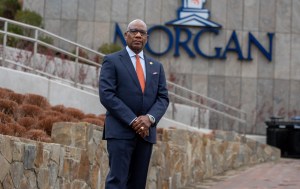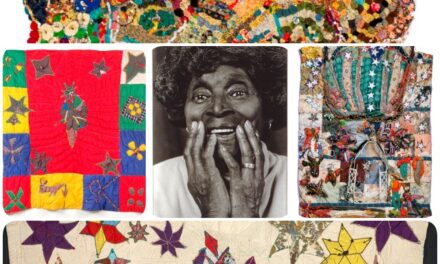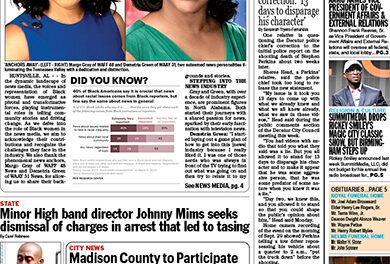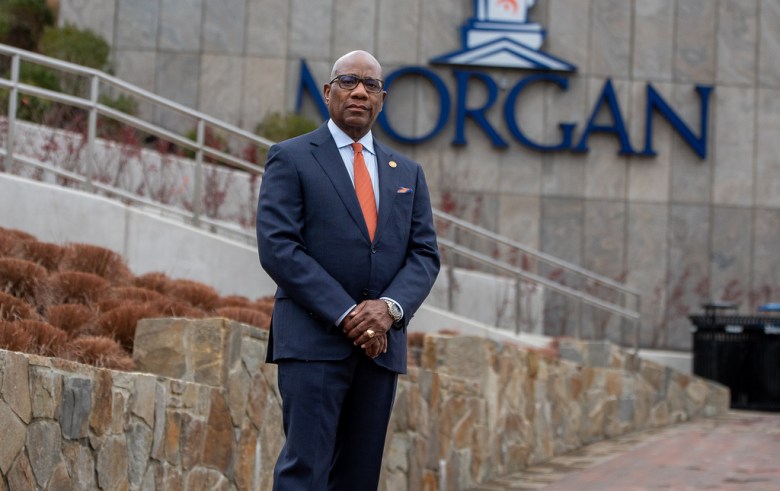
By Alexis Taylor
Special to the AFRO
While we may never know what went through Henry Wilson’s mind the night before, we know what he eventually did.
Daring to grow a different future for the last five of his ten children, the sharecropper gave in to demand: all five- including his youngest son, a part-time 6th grader named David- would begin attending school full time.
He had quietly changed his mind- college wasn’t “just for White folks.”
It was McKinley, Ala. It was Jim Crow’s South. And Henry Wilson knew if given the chance, his children could lead the world.
The decision meant fewer farm hands, but it secured a legacy of excellence that would include educators, business owners, a mayor and even a university president.
In fact there are several key players in the story of how David Kwabena Wilson rose to the helm of Morgan State University, Maryland’s preeminent public urban research university in 2010.
First there was a band of bold sisters who said they wouldn’t dedicate their brilliance to the fields. There was the 6th grade teacher, Louvenia Abernathy Coats, who first said “college.” And then there was the legendary H.L. “Prof” Charlow. The vocational agriculture teacher drove Wilson and a few others to Tuskegee University- three hours away- to immerse them in the reality of what “Black” could look like when given half an opportunity and left to flourish.
Strategically taking the long route, Charlow made first-hand witnesses of the boys left speechless by thriving Black schools, Black businesses and Black-owned homes that could fit 10 of their shanties inside.
“The seat of Black intellectualism in America was in Tuskegee,” said Wilson, remembering the awe he felt laying eyes on the historically Black college and prestigious, Black neighborhoods.
“I left there and said ‘Oh my God- I could do things like these people have done. I could live a life like this.”
And indeed he has.
This year Wilson takes the AFRO Person of the Year title as the man who has held retention of freshmen at 70 % at Morgan for 10 years in a row, achieved record-breaking graduation rates and founded the School of Global Journalism and Communication at the historically Black university, founded in 1867.
The 9th grader, first inspired by an HBCU campus, is now partnered with the National Trust for Historic Preservation to enshrine Maryland’s largest HBCU as a “national treasure.” The only other HBCU bestowed this title is Howard University, founded in Washington D.C. the same year as Morgan.
Wilson has overseen an increase in Fulbright scholarships from five to 149, with Morganites in 44 countries around the globe. The university also now offers more than 140 different degree programs- an increase from the 90 offered when Wilson took office.
Under his tenure, Morgan State University has been upgraded from being an “R3” level institution of “moderate research” to one with “high research activity” on the doctorate level, or “R2” status.
There’s the $28.5 million grant from the National Aeronautics and Space Administration (NASA), with $18 million more on the way for multi-year investment.
And then there’s the story of Northwood Shopping Plaza, now Northwood Commons.
One can arguably be moved to tears when considering how Wilson brokered a $50 million dollar redevelopment deal for the same shopping center that once met Morgan students with vicious racist jeers and real physical threats.
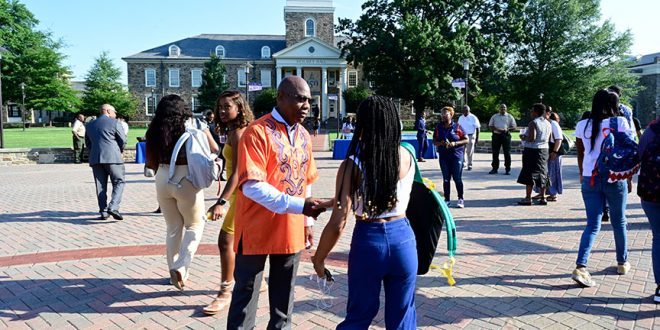
The original owners of the Northwood Shopping Center broke ground in 1949, three decades after Morgan College administrators purchased the university’s current Northeast Baltimore site.
By 1950 the Northwood Theatre opened and in 1954 Hecht’s arrived with the company’s first rooftop restaurant in a suburban setting.
But the segregated bliss could only last so long.
In 1955 students began a stand-in campaign at the theater after letters appealing to human decency and calls for desegregation proved unfruitful. This laid the groundwork for nearly a decade of protest.
In 1959 Morgan students agreed to stop picketing the Hecht’s in Northwood if desegregation talks were held. They learned from that mistake and returned in May 1960, resolved to be civilly disobedient until they could actually enjoy lunch on the roof.
AFRO archives from February 1963 detail mass arrests of more than 400 students from Morgan, Johns Hopkins University and Goucher College.
A caravan of paddy wagons formed as waves of peaceful students arrived to be arrested over a movie theater seat.
Their leader, renowned educator Martin D. Jenkins, chose silence and refused to comment on the injustices happening within walking distance of his campus.
One precinct filled up. And then another.
Finally, the theater gave in.
The space that once cost Morgan students their freedom became home to that same institution’s Earl G. Graves School of Business and Management and the Martin D. Jenkins Behavioral and Social Sciences Center in 2017.
And that was just the beginning.
Heavy-hitters are signing on to occupy the 100,000 square feet of retail space, with 80% of the offerings already taken.
Chipotle, a Morgan State University Barnes & Noble bookstore with a Starbucks, Lidl, Quickway Japanese Hibachi and Wing Stop will join Sunny’s Sub and McDonalds- staples of the shopping center’s previous iteration.
Baltimore’s premier Black-owned beauty supply store, Beauty Plus, will open a second location inside the shopping center, along with the Black owned Harbor Bank of Maryland.
“The Northwood Plaza redevelopment is the toughest external initiative that I have been involved in, in all of my career,” said Wilson. “Not really because of the fact that it’s such a vast project geographically, but because of the deep history and emotion associated with that property.”
Mistrust ran rampant on both sides of the table. Talks of a partnership led nowhere.
The slab of property became a derelict plaza, worrying scores of parents leaving their children directly next door to the eyesore.
Students were routinely robbed walking through the plaza and in September 2008 former councilman Kenneth Harris Sr. lost his life during a hold-up.
A change had to come- and all parties involved knew it.
“It took me years to align the appropriate vision for the shopping center with the vision that we have for Morgan over the next 30 years and the vision that the community has for itself beyond Morgan,” said Wilson. “When I pass by the center now I see the results of our collective work, meaning the work of Morgan, the work of the community, the work of the family, the work of the developer, the work of the City and the work of the Lieutenant Governor, who played a critical role in helping us financially.”
“I marvel at how far we have come,” said Wilson.
If 10 years in office have proven anything, it is that this man is constantly working to elevate a school founded by former slaves into the greatest institution in the nation.
“Morgan must constantly be on the move,” said Wilson. “We will not go through a period at Morgan during my presidency where we say, ‘now it’s time to rest.’”
Even in the face of a global pandemic, the 10th Morgan president refuses to slow down.
When the virus crept into his own territory, claiming the life of his eldest brother and landing him in isolation with a 101 degree fever, Wilson knew he couldn’t fall apart- 8,000 students were depending on him. He watched his brother lowered into the ground via Facetime and resolved to carry on.
“I had to figure out my own way of coping,” said Wilson. “I usually go to the gym at the local YMCA each morning for cardio. And of course all the gyms were closed- everything was closed.”
Relegated to a space with workout equipment in the basement of Hurt gym during the pandemic, the 67-year-old began to make decisions not faced by Morgan State University presidents in 100 years.
Data-informed decisions made at 8 a.m. would change based on information provided at noon. Students lacked uniform access to reliable broadband internet, there was a homeless population that couldn’t be sent home when the virus shuttered the campus and Wilson was responsible for protecting a demographic hit hardest by the virus.
“Leading Morgan through a pandemic was not a course that I took in grad school,” he quips.
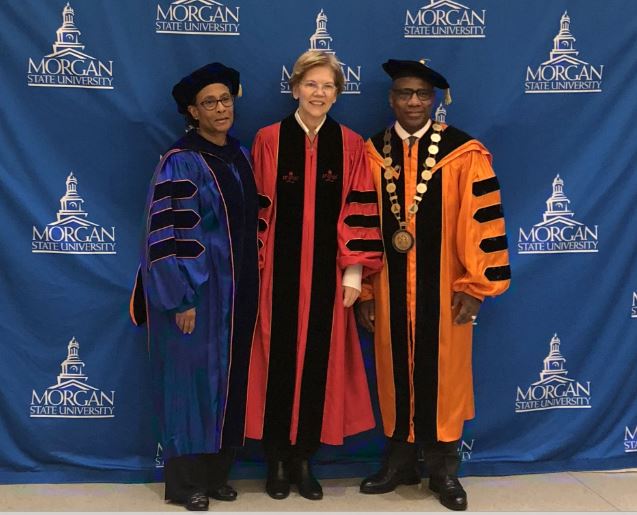
When asked where he gets his energy from, the proud father of a Morgan alum is anything but unsure.
“What really keeps me not just going- but going and freshly motivated- is my love of Morgan,” said Wilson. “I spend 12 to 14 hours each day in a labor of love for Morgan, but I say to people ‘I feel like I never work a day in my life.’ I’m energized by the calling. And when you are energized by an opportunity, it’s not work.”
Wilson’s dedication to the institution has led to unmatched and unprecedented success in fundraising and innovative expansion. He says he will continue pushing Morgan forward as long as there is room for improvement and the Board is pleased with his work.
Like his father and grandfather before him, Wilson has truly dedicated his life to “growing the future” and “leading the world.”
The AFRO American Newspapers proudly names David Wilson, “Person of the Year.”
Help us Continue to tell OUR Story and join the AFRO family as a member – subscribers are now members! Join here!
The post Dr. David K. Wilson: AFRO Person of the Year 2021 appeared first on AFRO American Newspapers .

